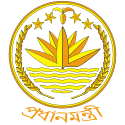Muhammad Mansur Ali
| Muhammad Mansur Ali | |
|---|---|
| মোঃ মনসুর আলী | |
| Prime Minister of Bangladesh | |
|
In office 25 January 1975 – 15 August 1975 | |
| President | Mujibur Rahman |
| Preceded by | Mujibur Rahman |
| Succeeded by | Mashiur Rahman (Acting) |
| Personal details | |
| Born |
16 January 1917 Kuripara, Bengal Presidency, British India (now Sirajganj, Bangladesh) |
| Died | 3 November 1975 (aged 55–56) |
| Political party | Bangladesh Krishak Sramik Awami League (1975) |
| Other political affiliations |
All-India Muslim League (Before 1949) Awami League (1949–1975) |
| Alma mater |
Maulana Azad College Aligarh Muslim University |
| Religion | Islam |
Muhammad Mansur Ali (Bengali: মোঃ মনসুর আলী; 1919 – November 3, 1975) was a Bangladeshi politician who was a close confidante of Sheikh Mujibur Rahman, the founding leader of Bangladesh. A senior leader of the Awami League, Mansur also served as the Prime Minister of Bangladesh in 1975.[1]
Early life
Muhammad Mansur Ali was born on 16 January 1919 in Kuripara, Kazipur, Sirajganj District in the province of Bengal (now in Bangladesh).[2] Mansur pursued his education in Kolkata Islamia College (now Maulana Azad College). He would pursue a M.A. degree in economics and law from the Aligarh Muslim University. During this period Mansur became an active member of the Muslim League, which under Muhammad Ali Jinnah demanded a separate Muslim state of Pakistan. He served as the vice-president of the Pabna District Muslim League from 1946 to 1950. He would join the Pakistan Army, receive training at Jessore Cantonment and attained the rank of army captain. Deciding to practise law, he enrolled in the Pabna District Court in 1951.[3]
Political career
He would soon be elected member of Awami League's central executive committee and president of its Pabna District unit. Mansur was arrested by police in 1952 for helping to organise protests against the declaration of Urdu as the sole official language, in what became known as the Language Movement. Mansur and his party demanded that Bengali also receive recognition and the provinces be granted autonomy. After his release, Mansur was elected a member of the East Pakistan Legislative Assembly in 1954 as a candidate of the United Front alliance of various political parties. In the cabinet headed by Ataur Rahman Khan, Mansur served in different periods as the province's minister of law, parliamentary affairs, food, agriculture, commerce and industry. Mansur was re-arrested in the aftermath of the coup d'etat led by Ayub Khan, who became President of Pakistan and imposed martial law. He would remain incarcerated from 1958 to 1959.[3]
Mansur Ali played an important role in the Six point movement led by Sheikh Mujibur Rahman, who demanded substantial regional autonomy and opposed the military regime. In the 1970 elections, he was elected member of the legislative assembly. At the outbreak of the Bangladesh Liberation War in 1971, Mansur went underground to organise a government in exile. Mansur became the minister of finance in the Mujibnagar government. After the independence of Bangladesh, Mansur was the minister of communications and later home affairs. After the introduction of a one-party, presidential system in 1975, Mujib became the President of Bangladesh. Mansur was appointed the prime minister. He helped Mujib organise the Bangladesh Krishak Sramik Awami League.[3]
Personal life
He married Begum Amina the daughter of a District Judge from the area of Rangpur. They had five sons and one daughter. His eldest son Dr Mohammad Selim became an advocate from Bangladesh and studied for the BAR at Lincoln's Inn, he is a prominent political figure and became Presidium member for Awami League and held the position of Chairman of Bangladesh Foreign affairs committee as well as being an MP representing his fathers constituency Kazipur in Sirajganj District. His second son Mohammad Nasim also became a leader of prominence and was MP and held ministerial posts of Telecoms and Home for Awami League government between 1996 - 2001
Death
On August 15, 1975, Mujib was assassinated along with his family by a group of military officers. It is believed that the plot was masterminded by Khondaker Mostaq Ahmad, a disgruntled member of Mujib's regime who would become president. Mansur went into hiding immediately after the killing. When Khondaker Mostaq Ahmad invited Awami League leaders such as Mansur Ali, Syed Nazrul Islam, A. H. M. Qamaruzzaman and Tajuddin Ahmad to join his government, they refused.[3] They were arrested by the army on August 23, 1975. Refusing to support Ahmad's regime, they were murdered while incarcerated in the Dhaka Central Jail on November 3.[4]
References
- ↑ Baig, Md. Azom (2012). "Ali, Captain M Mansur". In Islam, Sirajul; Jamal, Ahmed A. Banglapedia: National Encyclopedia of Bangladesh (Second ed.). Asiatic Society of Bangladesh.
- ↑ "In Memorium". www.smamedicalcollege-bd.com. Retrieved 2016-03-21.
- 1 2 3 4 "Ali, Captain M Mansur - Banglapedia". en.banglapedia.org. Retrieved 2016-10-11.
- ↑ "Supreme Court publishes full judgment of Jail Killing case". bdnews24.com. Retrieved 2016-04-14.
- Hariharan, R. (November 5, 2004). "Getting Away With Murder: Politicisation of Crime in Bangladesh". South Asia Analysis Group. Archived from the original on December 4, 2004.
- Rahman, Syedur (2010). Historical Dictionary of Bangladesh (4th ed.). Scarecrow Press, Inc. p. 88. ISBN 9780810874534.
| Political offices | ||
|---|---|---|
| Preceded by Mujibur Rahman |
Prime Minister of Bangladesh 1975 |
Succeeded by Mashiur Rahman Acting |
